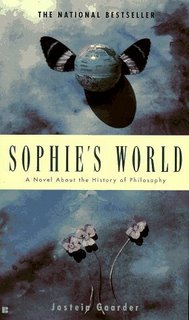
The novel ‘Sophie’s World’, written by Norwegian writer Jostein Gaardner isn’t all that it would seem to be. Indeed, with a title like that, and by reading the first few pages or so about a young girl named Sophie and her life, the book almost sets itself up like a children’s or a young adult centered storybook. This assumption just might be true, in a way, since the main purpose of this book is education in the basics of philosophy, and it is done in such a way that possibly even a twelve-year old can understand it, let alone a person who’s about to study it at a platform of higher education.
So the story starts with minor details of Sophie’s life, and how when she comes home one day from school, she receives a letter with nothing but two questions in it: ‘Who are you?’ and ‘Where do you come from?’ With no way to identify the sender, or where it came from in the first place, this letter is only the beginning of other letters with equally thought-provoking questions, as well as letters containing, as the letters claim, ‘a crash course in philosophy’. These letters cover philosophy from the time of Plato to the slightly more modern Jean-Jacques Rousseau and his ‘Social Contract’.
In order to keep the reader interested, the story obviously isn’t all about the philosophy lesson. There are questions resolved, starting with the obvious ‘Who is the person sending Sophie these letters?’ followed by the fact that she also starts to receive birthday cards and letters addressed to one ‘Hilde Knaag’, a girl she has never met before in her entire life.
Where the story starts, it seems like a story about real life, or something that very well could have happened. Then things start getting bizarre. Characters from storybooks or old fairy tales appear abruptly, say cryptic things, then disappear. A videotape she receives shows Ancient Greece. Real Ancient Greece, not the kind made in a studio. The reader won’t be able to help but wonder if our young Sophie is going mad.
Then of course, comes the twist that no one sees coming, just like in every other good book. Obviously I won’t say what it is here, but it is one of the best things about this book. What makes it an enjoyable read is its unpredictability. Almost anything can happen. And while you’re reading it, you won’t realize that what you’re really reading is a Philosophy textbook disguised as a story, not until you finish and think about it again.
There is a lot to learn from this book, and the language used is mostly simple and easy enough to understand, making it a lot easier to digest than a textbook. For me it was an introduction into the world of philosophy, and I don’t think I’ll ever look at the world around me quite the same ever again. So all in all, if you’re looking for a good read, and want to learn something new as well, this is the book for you.
But then again, this should probably only be for people who are interested in philosophy. Honestly speaking, I wasn't that interested in philosophy, and thus I found myself skipping or rushing through some parts. Of course, it seems like a cool deep thing, like 'Whoa, where do we come from?' or 'Whoa, what does it mean to be human?' So well, though some parts were intriguing to me, eventually it got old by the end of the book. I mean, as a general way to look at it, I think people who like to discuss 'Why men exist' over a coffee at Starbucks are people who like to believe they are deep. Personally, I admit that philosophy is important in some expects, but I don't trust the ideas different people have when it comes to 'How man should live to be most productive/happy'.
I think we've had enough productive/happy. So much that we're blowing up each other just for more wealth. Maybe if we didn't divide each other so much-
Hah. Never going to happen. Mankind is a plague.
I give this book a 6 out of 10.
